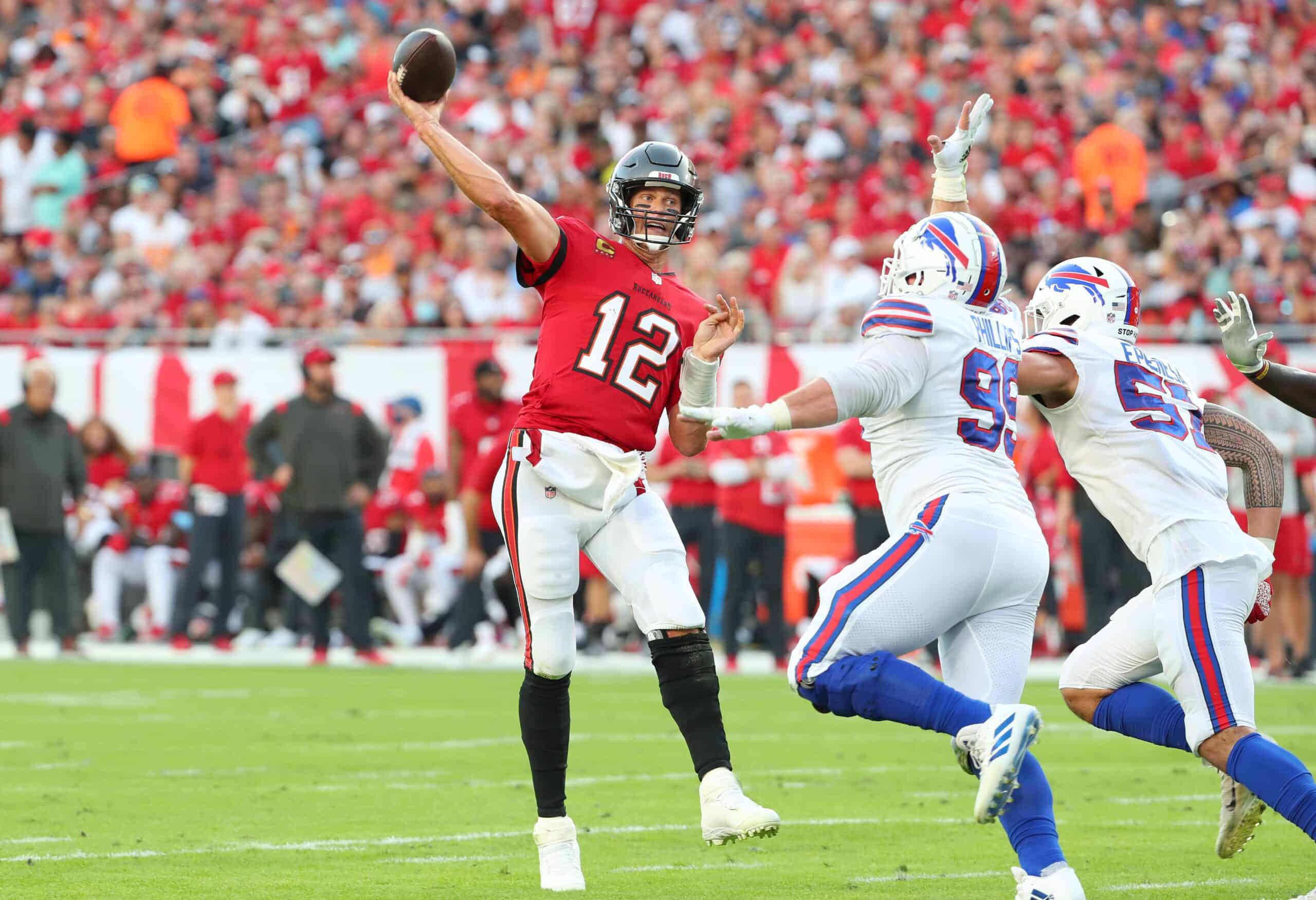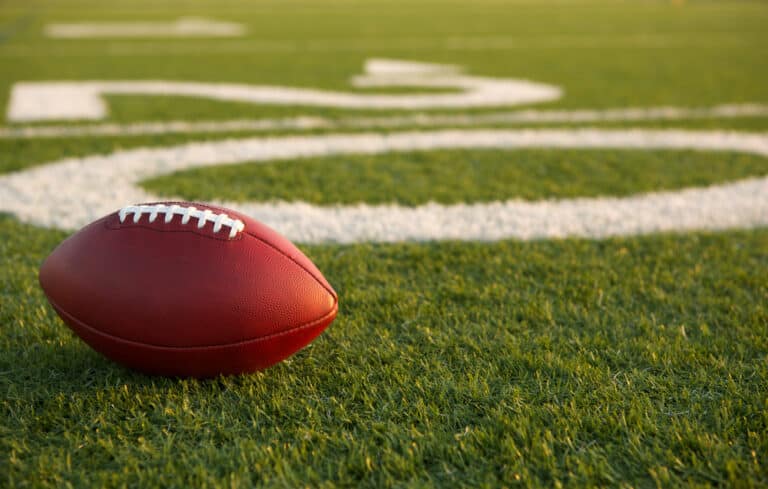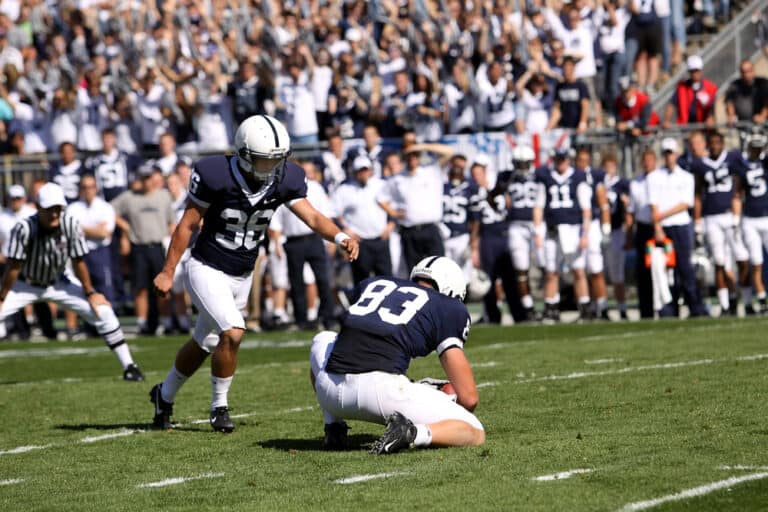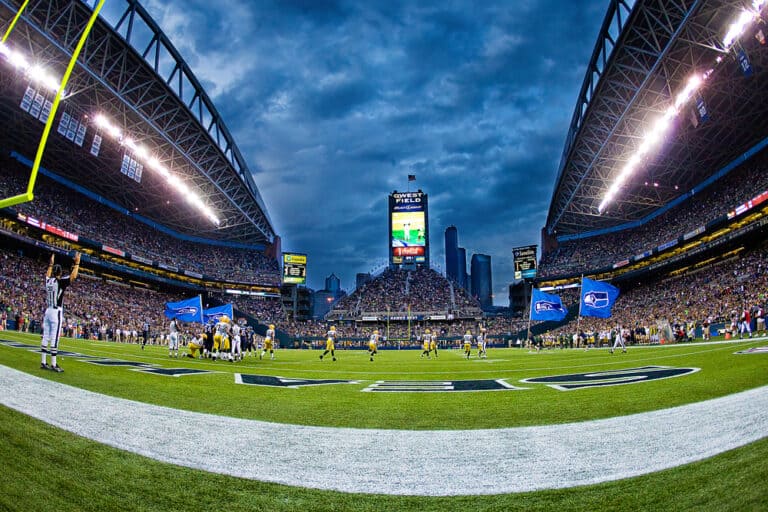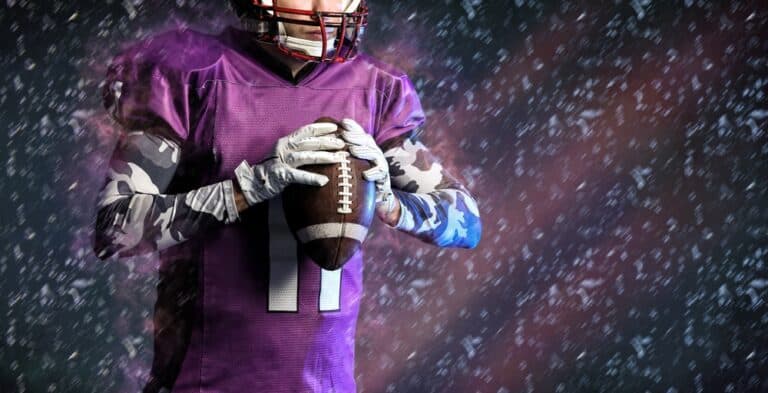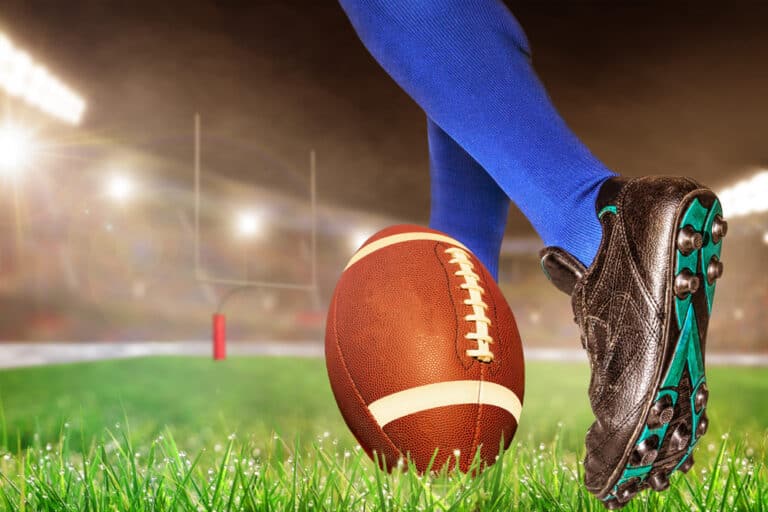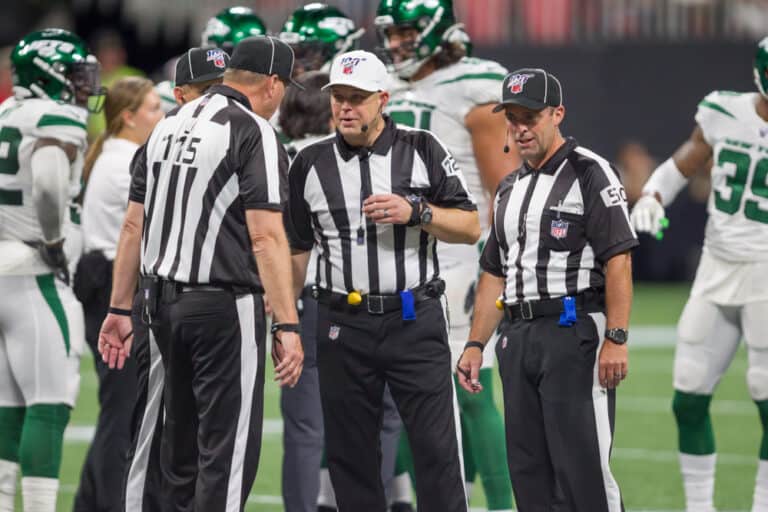Are NFL Games Rigged? (Here’s The Truth)
Editorial credit: Steve Jacobson / Shutterstock.com
When we look at NFL as a company, compared to NFL as a sport, certain lights flicker alarmingly red when the question is raised, “Are NFL games rigged?” Many fans will defend the legitimacy of the NFL organization, as they love the sport so much, while others casually point to the obvious ways how they manage to get away with it.
Many fans believe that some NFL games are rigged and cleverly orchestrated through referees who assist certain teams with the help of penalties. A few ex-NFL players have alluded to the fact that the NFL is a show focused on entertainment rather than a real sport.
To question the legitimacy of America’s favorite sport is frowned upon, and most die-hard fans will brush it off as a conspiracy theory before happily placing their bets with NFL’s betting partners. Why would you need to rig the most watched sport in the first place? And how is it done?
Are NFL Games Rigged?
This question divides the loyal fanbase of the NFL. A big part claims that to rig NFL games would require too big a participation from too many role players and happily practice cognitive dissonance to protect the belief that NFL is a clean sport.
Suppose you don’t believe that any major professional sports leagues would ever try to control, script, or rig the outcome of one of their games. In that case, you need to look at the following information and make your own conclusion if the sport we love is primarily “show business” before it’s a sport.
The NFL Is A Sports Entertainment Company
In a lawsuit against the NFL in 2010 over licensed merchandise like caps and t-shirts, the NFL argued that it should be treated as a single entity (NFL clubs are members of a unit that share revenue) rather than 32 individual franchises.
As the dispute progressed, the NFL maintained its legal stance as a “sports entertainment” company, not a legitimately competitive “sport.” One such “collegiate sport” is college football. Professional wrestling (WWE) and roller derby are the only examples of “sports entertainment” businesses.
NFL Lawyer Gregg H. Levy stated during the trial, “long as the NFL clubs are members of a unit; if they compete as a unit in the entertainment marketplace…they should be deemed a single entity not subjected to antitrust law.”
The NFL Doesn’t Employ Referees
The NFL doesn’t employ referees. Why would they? It’s much easier to blame the officials for a “poor” display where a couple of dubious calls ultimately cost one team the game. Referees are kept separate from the NFL, giving them a shiny cushion of plausible deniability.
Instead, referees and their crew (7 officials on match day) are reviewed after the conclusion of a season. Referees who make “bad” calls, controversial calls, and who fail to make the correct calls in the crucial dying moments of a match are typically not suspended or fired.
The NFL is the only sports league that doesn’t employ its referees, which means little accountability from their side when these part-time employees make a “wrong call” on the field.
The NFL Shares Its Revenue With All The Teams
The NFL has drafts, is protected by antitrust exemptions, and shares its revenue with all the teams in the league. The NFL shares over 70% of its massive $10 + billion yearly income with all the participating teams.
Ticket sales get split into 66% for the home team, with the other 34% being shared with the rest of the franchises. No league distributes as much of its income as the NFL. It makes business sense to comply with what the NFL asks of you as a team (franchise), seeing that they are responsible for most of the income generated and distributed to the 32 teams.
If NFL teams were independent entities, as they want you to believe, none of the above would exist, as the NFL structure is the opposite of how a free-market company would operate.
Federal Laws Are Not Against Scripted Games
The Sports Bribery Act of 1964 was created to combat the influence of organized crime and the gambling industry on sports, stating the following:
“Whoever carries into effect, attempts to carry into effect, or conspires with any other person to carry into effect any scheme in commerce to influence, in any way, by bribery any sporting contest, with the knowledge that the purpose of such scheme is to influence by bribery that contest, shall be fined under this title, or imprisoned not more than 5 years, or both.”
The word “bribery” is the operative term in this statute. It is not a violation of the law for a league to order an employee (official, coach, or player) to influence or control the result of a game. For the same reason, the Sports Bribery Act does not apply if a referee or player unilaterally chooses to shave points or manipulate a game.
So far, the Sports Bribery Act has never been used to make an arrest in connection with a game involving the National Football League, the NBA, Major League Baseball, or the National Hockey League.
Ticketholders Have No Right To A Legitimate Contest
Even after NFL Commissioner Roger Goodell destroyed the evidence, the New England Patriots were found cheating in 2007 by videotaping their opponents’ formations and coaching signals (Spygate). It turned out to be something they’d been doing for a decade.
Carl Mayer, a season-ticket holder for the Jets, filed a lawsuit against the Patriots seeking compensation for himself and his fellow Jets supporters. He went on to lose the case, as the NFL claimed, and the court agreed, that fans who pay for a ticket to an NFL game have the absolute minimum contractual entitlement to a seat from which they may see two teams play.
If the Patriots used illegal methods to get the victory, then so be it. It implies that the NFL would be in the clear, legally speaking, if any of their games were manipulated.
The NFL Puts On A Show
Whatever your personal feeling might be, rigged or scripted or just a case of favoritism to certain popular teams to fit a certain narrative. One thing is certain the NFL knows how to put together a live “presentation” that entertains hundreds of millions during the Super Bowl.
Close games enhance the excitement and drama and result in more betting viewers. The NFL and its gambling partners bank on millions of people watching and placing bets on their games. It’s funny how much closer the score lines have grown when you compare the first half of Super Bowls and those post 9/11:
- Superbowl 1-35: Only 9 games were decided by a touchdown or less, and only 2 games had been decided by a single field goal or less – the average win was by 16.7 points (or more than 2 touchdowns.)
- Superbowl 36-51: A whopping 10 out of 16 games have been decided by a single touchdown or less, 5 came down to a field goal or less – the average win was by 8.7 points.
Most people aren’t aware that over 70% of all games are decided against the line in the last possession. The lines are so good that bettors swing between winning and losing depending on what happens in the last possession in most cases.
It’s become somewhat of the norm to see games being won in a final couple of minutes (especially the big games.)
Ex-NFL Players Confess It’s A Show
Every now and again, a retired player who hasn’t signed any confidentiality agreement with the NFL already says what most of us suspect.
Here are some quotes from players who played in the NFL and experienced the culture and the reality of what the NFL represents:
- ”The NFL is scripted, but they make us sign something, so we can’t go into detail…Tired of holding back…Who wants the full story?” — Ex-NFL player Benny Cunningham
- “We’re talking about a different NFL now … before it was more about the game. Now it’s such an entertainment business. It’s turning into the WWE really. It’s like the Vince McMahon stuff. Basically, [Roger] Goodell is like Vince McMahon.” — Cleveland Browns tackle Joe Thomas
- “[The NFL is] like a spectacle of violence, for entertainment, and you’re the actors in it. You’re complicit in that: You put on the uniform. And it’s a trivial thing at its core. It’s make-believe, really. That’s the truth about it.”– former 49ers linebacker Chris Borland
- “And we all know, now that we’re grown men, that wrestling’s fake. Well, football is not played like it was when I played.” — retired Houston Oilers RB and Hall of Famer Earl Campbell
The NFL Is Tied To Gambling
Less than a decade ago, the NFL warned that the legalization of gambling on sports would fuel growing suspicions of the integrity of the game and further strengthen the view that games are rigged. Fast forward a few years, and you will find that the NFL is in bed with numerous betting partners, gambling companies, and casinos. Money corrupts all.
Because gambling is the primary draw for spectators, games with questionable calls, plays, and conclusions are taken at face value as proof that the games are rigged, the books are cooked, and every official on the scene is in on it. You can’t blame the fans for feeling this way.
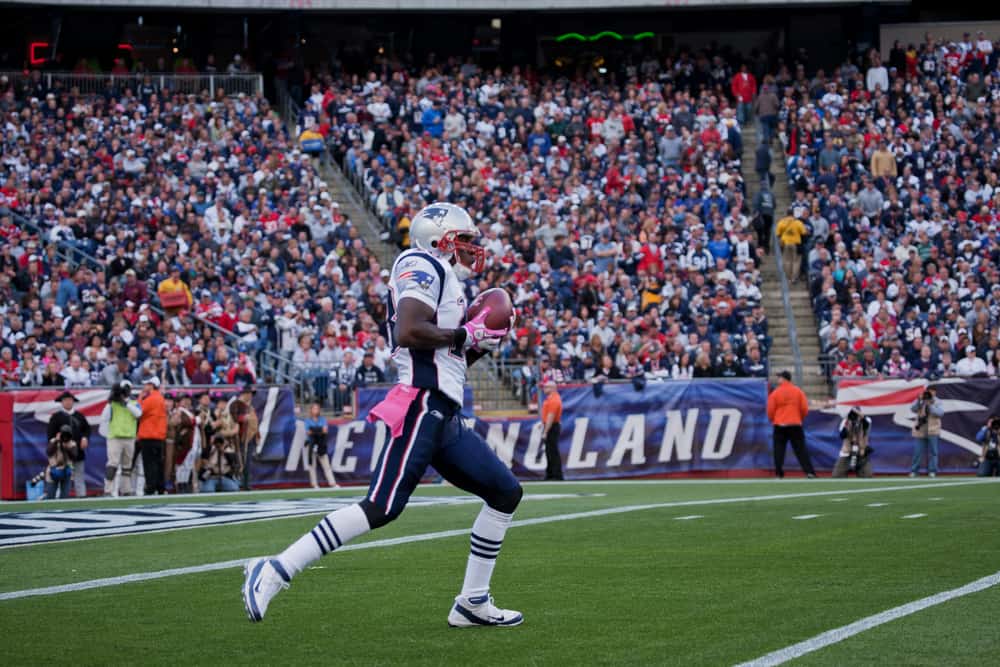
NFL Games And Seasons That Were Rigged
NFL fanatic fans study the sport with such intensity (especially when money is on the line) that some quickly understand or spot when something happens in a game or even a season that shouldn’t have been allowed to happen under normal circumstances.
Here are some examples of games and seasons that could have possibly been rigged or where a certain “storyline” was preferred and “guided” toward a certain outcome:
Super Bowl III: New York Jets vs. Baltimore Colts 1969
This game has gone down in football history as one of the greatest upsets ever and the reason modern-day NFL exists. With the future of the AFL-NFL merger at stake, the NFL couldn’t afford to let the Colts (16-1), who were huge favorites, win.
A Jets victory would result in at least a billion dollars for the NFL owners. So, when –18 point underdog Jets quarterback Joe Namath came out days before the game and boldly declared that his team would beat the heavily fancied Colts, it could not have been predicted by the fans what would happen next.
Not only did the Jets beat the Colts 16-7, but Namath was also named MVP, whereafter he declared “we overcame our critics” and “most people predicated a 42-13 loss.” If there were a billion reasons to rig a game or tank a game, it’s this one.
Super Bowl XXXVI: New England Patriots vs. St. Louis Rams
After the horror of 9/11, the people of America were in pain. Patriotism needed to be fired up. Who’s the most patriotic NFL team? If you said the New England Patriots, you would be correct, and out of nowhere, they stormed to an unlikely Super Bowl win when they beat the heavily favored St. Louis Rams 20-17.
One-sided officiating allowed Patriots DBs to mug “Fastest Show on Turf” WRs, ultimately leading to the demise of Rams MVP quarterback Kurt Warner. And the “Michael Jordan” of football wins his first Super Bowl ring, followed by 6 more; Tom Brady still wins them at age 44.
Super Bowl XLIV: New Orleans Saints vs. Indianapolis Colts
When Hurricane Katrina hit New Orleans, it caused massive damage and killed nearly 2,000 people. The residents were devasted and needed a good dose of hope.
That hope was provided when the New Orleans Saints did the “unimaginable” by winning Super Bowl against the Indianapolis Colts, against all odds. What an inspiring sports story. Or is it?
New England Patriots 2017 Season
The entire New England Patriots 2017 campaign. The beneficial “officiating” had fans in conspiracy mode in no time. Have a look and decide for yourself.
NFL Stories Are Almost Too Good To Be True
Every sport has a story to tell. Fans love a zero-to-hero story, where an underdog beats the favorite against all odds, resulting in a Hollywood story depending on the magnitude of the fans’ response or amazement.
The NFL has had some awesome storylines across the decades, from the Patriots winning after 9/11 to the Saints winning after Hurricane Katrina. The Falcons and the Rams made it to the Super Bowl a year before moving into their new billion-dollar stadium.
The remarkable story of Archie, Peyton, and Eli Manning all achieving great success at quarterback, winning Super Bowls against all odds. The list goes on, and it reads like a fairytale at times.
If you want to read a real NFL story that will make you think twice if what you are seeing on your TV and mobile screens is real, the following books make for interesting reading:
- The Fix Is In by Brian Tuohy
- Interference: How Organized Crime Influences Professional Football by Dan E. Moldea
NFL Team Owner Issues Tanking Orders
The bright side of having a bad season in the NFL (and most other professional U.S. sports) is that the teams with the worst records get the first pick in the draft of talented young college players the following year.
Amid a 58-page complaint filed in February, accusing the NFL of persistent racial prejudice, Brian Flores said that Ross suggested that they tank as many games as possible in his first season as newly appointed head coach of the Miami Dolphins in 2019.
Flores was allegedly directed by Dolphins owner and billionaire real estate tycoon Stephen Ross to “tank” as many games as possible in exchange for a $100,000 bonus for each defeat. According to Flores, he was fired after the season for refusing to do just that, which led to a fight with Ross and the team’s administration.
After an investigation, it was found that Dolphins owner Ross was guilty of “suggesting tanking” and blatant tampering in making impermissible contact with Tom Brady while he was still under contract with the Patriots and with Sean Payton when trying to get him to leave the Saints.
The NFL investigation downplayed the tanking charges (as Flores didn’t follow through on the tanking instructions), and as usual, a billionaire owner got away with murder. Commissioner Goodell fined billionaire Ross $1.5 million and vice-chairman Bruce Beal $500,000, a slap in the face to all loyal fans.
If you compare it to Clavin Ridley’s 1-year suspension for betting $1,500 earlier in the year, it’s a slap on the wrist. The suspension equates to a fine of $11 million, as this was the salary earned at the Falcons.
And to add further fuel to the rigging fire, the commissioner of the NFL, Rodger Goodell, has always struggled with a credibility problem. The main man has the $63 million a year responsibility to take the hits for billionaire team owners while pretending to care about the integrity of the NFL. His acting does not fool most.
Conclusion
Rigged, scripted, or guided, the NFL is a show worth watching, and until we get a high-ranking official that comes out and swears under oath that the NFL is rigged, we won’t know for sure. But fans are not stupid and are starting to notice a trend regarding some teams being favored when it makes for a better storyline.
The NFL is entertaining, and we as fans can’t say with 100% certainty how much of the show is real, but that doesn’t mean we won’t watch the next “game,” as it’s the best show in America.
References
- https://www.thefixisin.net/
- https://www.mediapost.com/publications/article/313959/string-theories-is-the-nfl-broken-because-its-fi.html
- https://www.nytimes.com/2022/02/10/sports/nfl-bets-gambling.html
- https://www.thefixisin.net/the-proof-5-facts
- https://nypost.com/2022/03/19/with-gambling-now-established-as-a-primary-reason-to-watch-games-games-that-included-dubious-calls-plays-and-decisions-then-were-left-for-standard-consumption-and-debate-are-now-conclusively-seen-as-e/
- https://nypost.com/2022/03/10/roger-goodell-as-guilty-as-calvin-ridley-by-preying-on-nfl-fans/
- https://www.si.com/nfl/2022/08/03/roger-goodell-has-credibility-problem
- https://www.nytimes.com/2022/02/10/sports/nfl-bets-gambling.html
- https://bleacherreport.com/articles/927838-nfl-10-potentially-scripted-nfl-stories-from-the-past-decade
- https://www.quora.com/Are-NFL-games-rigged
- https://databases.usatoday.com/nfl-arrests/page/4/
- https://www.bloomberg.com/news/articles/2022-02-02/dolphins-owner-dangled-100-000-per-tanked-game-ex-coach-says
- https://www.sportscasting.com/do-nfl-referees-ever-get-fired-for-bad-calls/

